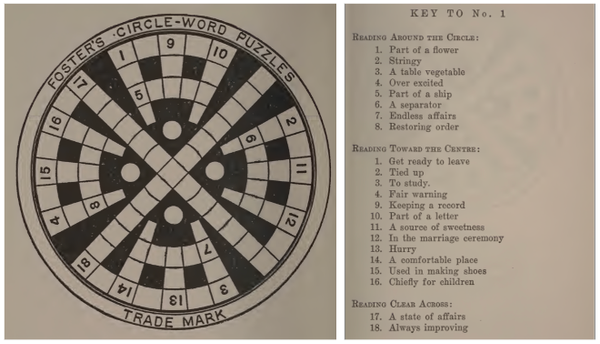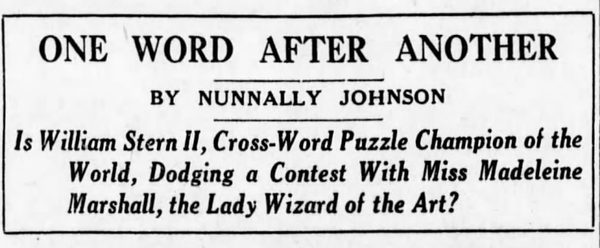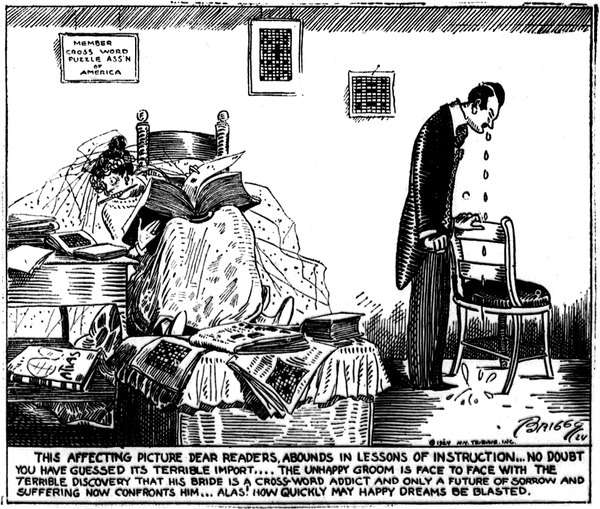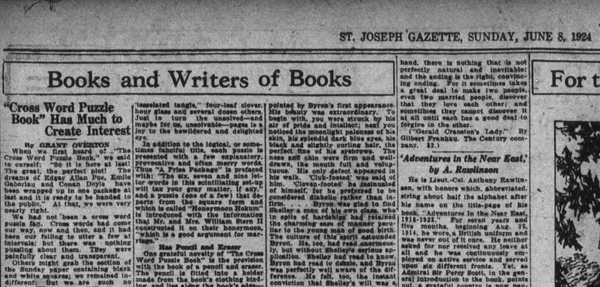The Second Crossword Book: "Buy it and Estrange Your Family!"
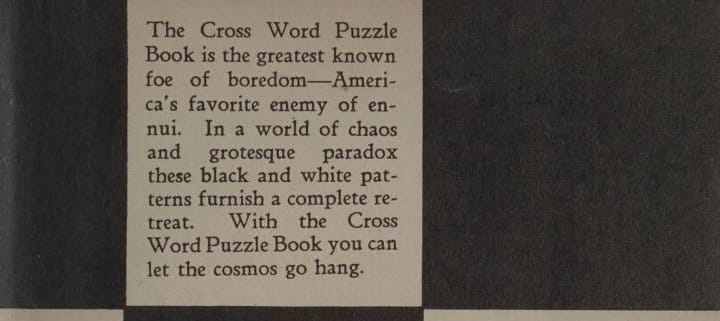
In August 1924, just four months after the publication of the book that set off the crossword craze, Richard Simon and Max Schuster were back with a new collection, dubbed The Cross Word Puzzle Book, Second Series. And unlike the first time around, when the publishers were too wary to even put their names on the title page (instead using the dummy imprint Plaza Publishing Company), the second book proudly bore the corporate name of "Simon and Schuster, Inc." A new publishing empire was born, all on the backs of a couple of puzzle anthologies.
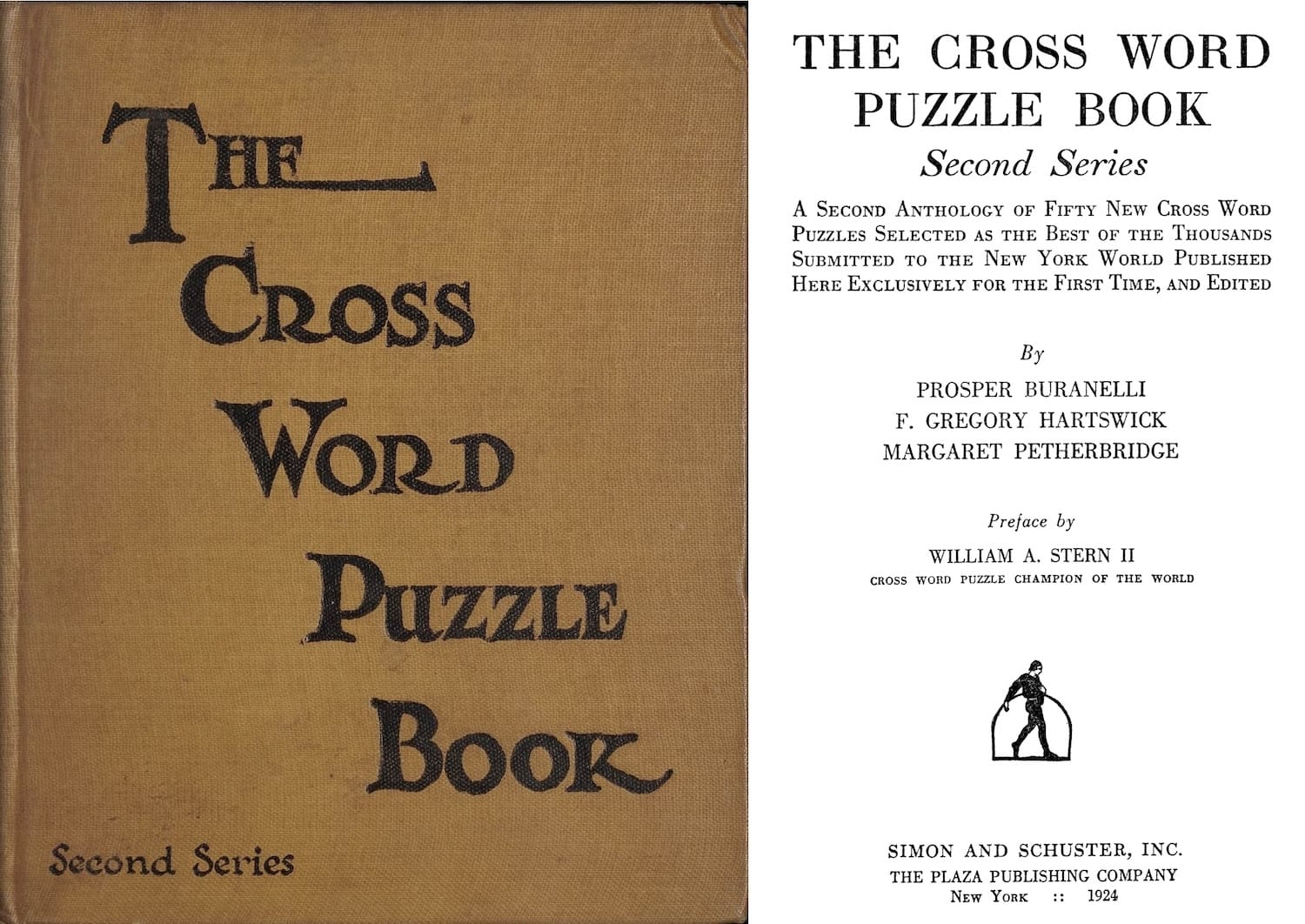
Simon & Schuster knew they had a massive publishing hit right out of the gate, so plans for the Second Series took shape quickly. The publishers advertised in trade journals and magazines to build the hype. An ad in Publishers Weekly on July 26, 1924 began:
In the race for best-sellerdom The Cross Word Puzzle Book started out as a dark horse. Book-sellers were skeptical of a book one writes in rather than reads.
Six weeks after publication in April, The Cross Word Puzzle Book was ranked Number One on the non-fiction best-seller list at Brentano’s, and Number Four on the national ranking prepared by Baker and Taylor, advancing three weeks later to Number One—the best selling non-fiction book in America! Cross-Word Puzzling began to trump Bridge and pung Mah-Jong. This game of filling in the tantalizing word-patterns has all the raging intensity of a fad (“sweeping across the country with a whirlwind rush,” says The New York Times) plus the permanence of an instructive and absorbing pastime.
Like the first series, which has gone through edition after edition and is still a steady best-seller, The Second Cross Word Puzzle Book will contain fifty, never-before-published puzzles. The multitudes who have been spending hours over the first series will welcome the same format, the same price ($1.85) and again that life-saving pencil and eraser!
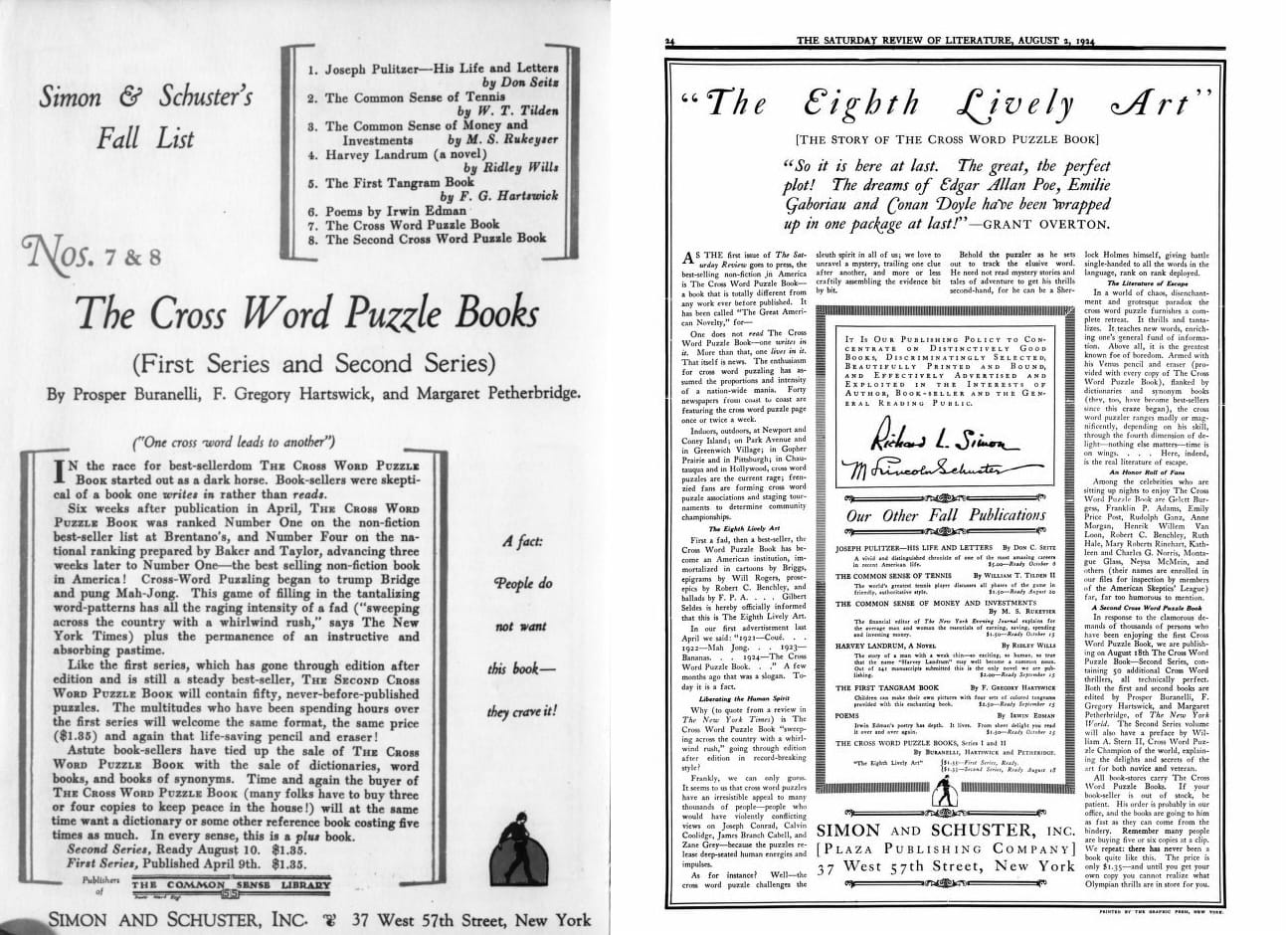
On Aug. 2, the first issue of a new magazine, The Saturday Review, hit the newsstands, and the promotional copy from Simon & Schuster was even more florid:
As the first issue of The Saturday Review goes to press, the best-selling non-fiction in America is The Cross Word Puzzle Book—a book that is totally different from any work ever before published. It has been called “The Great American Novelty,” for—
One does not read The Cross Word Puzzle Book—one writes in it. More than that, one lives in it. That itself is news. The enthusiasm for cross word puzzling has assumed the proportions and intensity of a nation-wide mania. Forty newspapers from coast to coast are featuring the cross word puzzle page once or twice a week.
Indoors, outdoors, at Newport and Coney Island; on Park Avenue and in Greenwich Village; in Gopher Prairie and in Pittsburgh; in Chautauqua and in Hollywood, cross word puzzles are the current rage; frenzied fans are forming cross word puzzle associations and staging tournaments to determine community championships.
In fact, the winner of the first crossword championship was pressed into service to write the preface for the new book. William A. Stern II, who bested all competitors in the contest held at the inaugural crossword convention on May 18, reminisced about his first encounter with the novel kind of puzzle and his immediate addiction to it.
Two years ago I saw a friend of mine earnestly studying a checkered diagram in the magazine section of a Sunday newspaper. Curiosity impelled me to ask him whether he had taken up cross-stitching, because the pattern he so zealously pored over resembled closely that of an old-fashioned sampler. When he explained that he was attempting to solve a puzzle I laughed, because in my ignorance I believed that puzzles were childish time-wasters. I snorted my disdain at this sort of balderdash and, angered, he challenged me to try my hand at it.
I confidently predicted that I would easily solve the foolish enigma and after he had explained the manner of solution I set to work. A few minutes later I started asking questions. What was one supposed to do? My friend explained a second time and I was all at sea. Finally I understood what to do, but was shaky on how to do it. I finished that puzzle the next day. I gave little thought to food and rest; in the end I triumphed.
The second Cross Word Puzzle Book was published on Aug. 10, and as editor Margaret Petherbridge (soon to be Farrar) would later recall, it was just as big a hit as the first book, selling 110,000 copies. At the end of August, The Saturday Review ran an enthusiastic notice:
Mah Jong may be passing as a fad, but Cross Word Puzzles are in their heydey. Of their second book of Cross Word Puzzles the enterprising publishers, who have taken the fad at its flood and ought to reap a golden harvest from the Cross Word-mad, remark “This book will give you one hundred hours of the best sort of fun.” Fun, yes—and agony! The writer of this note is a Cross Word Puzzlist in the duffer class, and has found the game as fascinating and as insidious as golf. Once an addict and you wake in the middle of the night burbling, “A six-letter word meaning to eradicate, a nine-letter word synonymous with plum duff!”
So here are fifty new puzzles, the book being edited by Prosper Buranelli, F. Gregory Hartswick and Margaret Petherbridge, the puzzles being furnished by various fine Italian hands. Buy it and you will probably estrange your family, divorce your wife, desert your children, ruin your business and devote your entire leisure (possibly in a nice, quiet cell) to the solution of “Seven Greek Crosses,” “Adam’s Rib” or “The Linoleum Pattern.” Alas and alack! Once having tasted blood, in the shape of a partial solution, the Cross Word Puzzlist is a gone goose! But at that you’d better try it; if only because, these days, “you may go where you please, you may skin up the trees, but you can’t get away from—The Cross Word Puzzle.”
With the promise of estranging your family and ruining your business, how could anyone resist?
(P.S.: Here in 2024, I'm starting up a newsletter, Zimmer on Language. Please consider subscribing to get dispatches from the world of words, and not just the kind that cross in a grid.)

